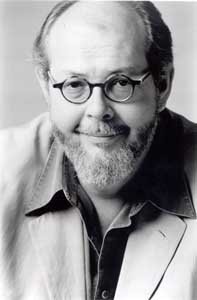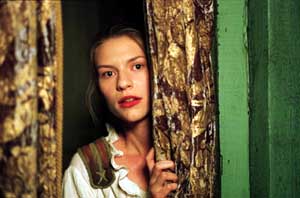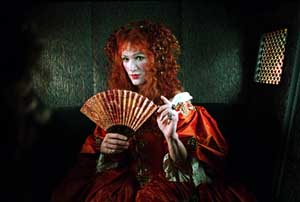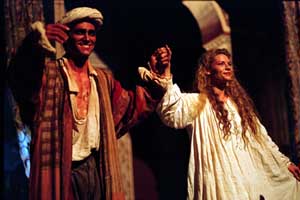-
- Lockyer: State constitution permits laws against same-sex marriage
- Pennsylvania Senate slur prompts apology
- Gay groups want DeMint apology for antigay comments during debate
- Baton Rouge court throws out same-sex marriage ban
- Census data shows many black same-sex couples are raising children
- Bay Area groups seek tolerance for transgender youth
- National News Briefs
- World News Briefs
Arts & Entertainment
Stage Presence
Playwright Jeffrey Hatcher talks about ‘Stage Beauty’, the film adaptation of his sexually adventurous play, ‘Compleat Stage Beauty’
Published Thursday, 14-Oct-2004 in issue 877
Is it possible that the man who co-wrote the goofy musical Lucky Duck – an adaptation of The Ugly Duckling, staged this summer at the Old Globe Theatre – could be the same person who penned Compleat Stage Beauty (produced at the Globe in 2002), the (mostly) true story of Edward Kynaston, the 17th century bisexual Restoration actor who won fame playing female roles? Jeffrey Hatcher is probably too modest to call himself prolific, so let me do the honors. The 46-year-old scribe has penned some 25 plays (his newest, A Picasso, won a 2003 Barrymore award for “outstanding new play”), two musicals (Lucky Duck and the 2004 Tony-nominated Never Gonna Dance), several books (Utopia and Other Places, Changing Stages), even a Columbo TV movie (Ashes to Ashes). His latest screenplay, about the notorious lothario Casanova, is being filmed by The Cider House Rules director Lasse Hallstrom.
Stylishly dressed in a dark shirt and jacket, with tan slacks and comfy shoes, his beard peppered with gray, the articulate and affable Hatcher is in San Diego to discuss the new film Stage Beauty, his adaptation of his enthusiastically received play, Compleat Stage Beauty, directed by Richard Eyre (Iris) and starring Billy Crudup (as Edward, or Ned, Kynaston) and Claire Danes – who met and fell in love during the making of the film, creating something of a “mess,” says Hatcher, since both performers were in serious relationships at the time.
Hatcher believes most of his plays, many of them of a historical bent, have to do with the “slippery notion” of identity. “I love any story where somebody is pretending to be something that he isn’t,” he says. “I like peeling away layers to reveal something else.” In terms of Stage Beauty, that includes sexual identity. “I think [the Restoration period of history] was a much more fluid time in terms of sexuality. And so many of the men in Kynaston’s [pronounced Kinniston] position were the mistresses, so to speak, of powerful men. A lot of these guys had ‘patrons,’ and Kynaston’s was the Duke of Buckingham – they were lovers. The Duke of Buckingham would have male lovers, then he’d get married and had children; his sons would have male lovers, then they’d get married and have children. This was the established order. Charles II didn’t give a damn, as long as nobody talked about it. If you said it out loud, you could have your head cut off.”
In the film, the Duke [played by Ben Chaplin, Tony-nominated this year for The Retreat from Moscow] prefers it, when he and the cross-dressing Kynaston make love, that Ned stay in drag. Does Hatcher believe men like Buckingham were sexually confused, that they desired men but were so conflicted they would “settle” for a man dressed as a woman? “I don’t think they really wanted a woman [in bed],” Hatcher offers. “Although the Duke’s sexual passion is for a man, his aesthetic passion is for a beautiful woman. I think the Duke is saying, I want to do with you what a man does with a man, but I want you to look a particular, lovely type for me. I’ve seen these HBO things where the guy says, look, I could have my penis removed [for you]. They’ve got breasts, and they look gorgeous. But that’s not the point: the point is to look gorgeous and have breasts and a beautiful ass, and have a penis.”
Hatcher hails from Stubenville, Ohio, “Dean Martin and Jimmy the Greek territory,” he jokes. He and his wife have lived outside Minneapolis, Minn., (“a great theater town and a great place to live”) since 1987 (he also has a son). Renowned playwrights August Wilson, Lee Blessing and Steven Dietz were also there in the ‘80s when, Hatcher says, the city was a “boomtown” for playwrights. It was a fellowship at the Playwright Center, a professional guild for playwrights, that brought him to the Midwest.
He got into playwriting “via acting,” which he studied at New York University. “I’d always written – high school papers, college skits and some one-acts – but somewhere in my 20’s I transitioned out of acting into writing. I already was bald and had a deep voice – I wasn’t really suited to play the 23-year-old that I was. Casting agents would say, ‘Some day you’ll grow into your type,’ but I didn’t want to wait 20 years.”
The idea for Compleat Stage Beauty came to Hatcher in 1998 while perusing one of Samuel Pepys’ [pronounced Peeps] many diaries. In discussing Kynaston in a 1661 entry related to theater, Pepys said he was “the prettiest woman in the whole house” that night. “I then realized, says Hatcher, “this ‘woman’ was a man. I was thrilled to death.” He turned out the play in just four months, specifically at the behest of the artistic director of a theater in West Virginia that needed a play quickly for its summer season. It premiered, to great acclaim, in 2000. The film version, made for a slender $12 million (“a lot of it was Richard twisting arms, things like that”), is likewise receiving ecstatic reviews. (Eyre landed the job to helm the film after one of its producers saw his production of The Crucible.)
“You could write this play like M Butterfly, where the central character kills himself at the end, or he disappears [from public view]. I read a review of Stage Beauty the other day in New York magazine. I think they liked the movie, but the writer felt the ending was too pat, that it would have been better if Billy killed himself as Othello. Yeah, that’ll be jolly!” says Hatcher. “I’ve got nothing against tragedy and suicide in drama, but that [type of downbeat ending] seems to me fashionably pessimistic. I don’t mean to sound Pollyanna, but it’s nice when people triumph over adversity, especially when adversity is inside themselves.”
The casting of Crudup and Danes was crucial to the film, Hatcher believes. ’“You don’t really know if people are going to have chemistry until you get them in a room together. Whatever that chemistry is, they developed it during the shoot. When you look at the film – especially Claire’s reactions to Billy – you can tell how attuned she is to him. Claire is one of the great reactors – I almost think she’s better when she’s not talking, because you can read so many emotions and thoughts on her face.”
Crudup was always at the top of Eyre’s and Hatcher’s short list for the role of Kynaston, in part because of his stage experience (he’s done his fair share of Shakespeare). “He’s a really handsome, dashing, sexy guy who in his heart of hearts is a character actor. It’s a role he plays truthfully, and with style and bravura – that’s hard to do without losing one or the other. Billy is willing to be ugly in the film, to be vicious and nasty; he’s willing to tempt the audience not to like him. Most actors send little signals that say, ‘you like me, I’m still likeable.’ Billy is willing to go to the edge. That’s daring and scary and dangerous. But when you win at something scary and dangerous, you win big.”
Is Hatcher happy with the film version of Compleat Stage Beauty? “Oh yes, very much so. I have minor quibbles – a line or two that was cut, one scene I thought was funny [that was excised]; but overall I’m a pretty happy guy, in a world where most screenwriters are the most bitter, depressed bastards on earth.” ______________________________
Kyle Counts is the film critic for the Gay & Lesbian Times. ‘Stage Beauty’ is currently playing at Landmark’s Hillcrest Cinemas.
|
|
Copyright © 2003-2025 Uptown Publications





